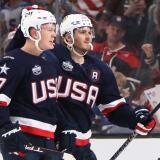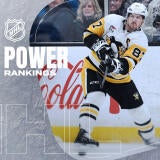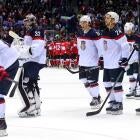Picking up the pieces from another early postseason exit by the Capitals
Another year, another early exit for the Washington Capitals. So how did this happen and who is to blame?

The answers never come easy this time of year for the Washington Capitals despite the all too familiar conclusion to their season. The questions will keep coming for a while, but the one that will burn for months is simply, "How?"
How, after a franchise-record 56 wins? How, after a Presidents Trophy and Metropolitan Division title? How, after icing arguably the best team in franchise history? How, with one of the game’s greatest stars as a captain and offensive leader? How, after all these years are the Capitals still unable to get past the second round?
After yet another second-round exit, this time in six games to a really strong Pittsburgh Penguins club after an utterly insane Game 6 loss in overtime, these are the kinds of things that have to be asked.
Alex Ovechkin was asked in not so many words something along these lines Tuesday night. He couldn’t find the words. Truth is, most independent observers can’t seem to figure it out either. This is going to be a hot topic in hockey circles all summer.
So let’s start hit some of the topics that will get a lot of run this offseason and some that won’t:
1. This is not Alex Ovechkin’s fault
The No. 1 laziest answer as to why the Capitals season is over is to blame the star. Ovechkin is the first one who gets the finger pointed at him almost every time. He’s the captain. He’s the leading goal scorer. He’s the face of the franchise and has been there for 11 seasons with minimal postseason success. He’s also not some magical being who can snap his fingers and bring a title to the nation’s capital. He’s also not even close to the reason Washington is out once again.
OK, so the game’s greatest goal scorer only scored two goals in the series, but he had points in four of the six games. That includes two assists in the decisive Game 6. He also poured 33 shots on goal in the series, so it wasn’t for lack of effort that the pucks didn’t always go in for him. There is no such thing as being able to literally score at will in the NHL.
Ovechkin has 82 points in 84 career games in the Stanley Cup Playoffs. He finished this postseason with 12 in 12, which includes five goals. That’s a high-level postseason performer.
The argument will inevitably turn to his leadership abilities or his personality, things that people other than those who are inside the locker room on a daily basis when the cameras and voice recorders are off won’t ever fully grasp.
And here’s a fantastic point from Ian Mendes of TSN:
And before you start ripping on Ovechkin, just a reminder that Steve Yzerman won his first Stanley Cup in his 14th season.
— Ian Mendes (@ian_mendes) May 11, 2016
One of the most respected captains in the game’s recent history had to wait a long while, too. Ovechkin is not necessarily doomed to an early exit for the rest of his career. Until he wins, the narrative will persist, but let's not act like he's the first star this has happened to.
He doesn’t and shouldn’t just get a free pass for the series, but if the focus of the loss is on him alone, it’s spectacularly misplaced.
2. The Capitals didn’t choke. They didn’t even play poorly in the series
There is a misnomer that if the favored team doesn’t win, they choked. That’s just not how it works in the NHL. Especially not with the new playoff format, where the best teams are often going to play each other within the first two rounds instead of in the conference finals.
The league has leveled out enough that even when you have a great regular season like the Capitals did, you might as well forget about it. The teams that make the playoffs are often good enough to beat anyone and regularly do. This time, they ran into the NHL's hottest team since mid-March and the Penguins stayed hot.
But beyond that, what will be lost in this aftermath is that the Capitals actually played mostly well throughout the series despite the result.
They held a slight edge in possession over the six games, blocked more shots, played more physically and even registered more “high-danger” scoring chances during the series according to war-on-ice.com. They did everything necessary to win except the most important thing: score more than the Penguins did. Even in that category, the series was remarkably close.
Every game except for Game 5, which the Capitals won, came down to a single goal. Three of those games went to overtime. This series is a few bounces away from being very different. Sometimes you have to make your own bounces, sometimes there’s nothing you can do.
The Capitals played well. The Penguins were a hair better in the department that matters most. This wasn’t a choke job. This was playoff hockey, where anything can happen. And if you’re the Capitals, it seems those things that happen are regularly unfavorable.
3. Some standout moments that ended up helping contribute to the Capitals’ early exit in 2016
As noted above, the playoffs can come down to a series of bounces or a play here or there that made all the difference. So let’s look at the series of plays that stand out as touchstone moments in the series.
Brooks Orpik getting suspended three games for a late hit on Olli Maatta in Game 2 seems like it happened forever ago now, but it was one of the pivotal moments in the series. The hit landed Orpik a three-game suspension, knocked Maatta out of commission for as many games and forced the Capitals into digging into their depth more. Some have said that the Caps may have been better off without Orpik, who was struggling with the Penguins’ speed, but any time a coach has to replace a regular player, it makes for some challenges. Orpik's three-game absence led to some musical chairs on the Capitals' bottom pairing, which would prove costly at least once as the Caps lost two of the three games he was out.
Barry Trotz inserting little-used Mike Weber into the lineup for Game 4 is another moment that stands out. You hate to single it out at all, but when a guy who has only played one prior postseason game this year goes in and happens to be on the ice for the biggest play of the game, it sticks out. Weber was the player who mishandled a puck and swatted it right to Patric Hornqvist’s stick for the game-winning goal in overtime. That gave the Penguins a 3-1 series lead, which put the Capitals on the ropes. That could have happened to anyone on the Capitals, but it happened to the one guy the team couldn't get into the lineup for the rest of the playoffs. Though, if Orpik isn’t suspended for that game, this decision never has to be made.
Now here are the key plays that stand out specifically from Game 6:
Karl Alzner got injured early in second period: Losing your No. 3 defenseman for the rest of a decisive playoff game would be tough for any team. Alzner took a slash from Sidney Crosby that was assumed to have been the cause of the injury. The defenseman later revealed he had been dealing with a groin injury. He was unable to continue in the game. Most teams have to deal with stuff like this over the course of a playoff run, though. It was still a bad break that impacted the Capitals lineup negatively in their biggest game of the year.
Brooks Orpik takes a double-minor for high-sticking, Pens score twice: The Capitals penalty kill had been so good in these playoffs that they had killed 95 percent of all disadvantages coming into Tuesday night. Orpik, in his first game back from suspension, got his stick up on Patric Hornqvist, drew blood and was handed a double-minor for high-sticking. Sure enough, the Penguins scored twice on the lengthy power play, doubling the amount of goals the Caps PK had given up this postseason. Those goals helped Pittsburgh build a 3-0 lead, forcing the Capitals to chase the game the rest of the way.
And none of that includes the literally dozens of little plays here and there over the course of the series – a hit post, an incredible save, a key blocked shot – that contribute to a team’s success or failure in the playoffs.
As my colleague Adam Gretz noted, this series could have easily been a sweep in either direction and it could have just as easily gone seven games. You can even go back to how close T.J. Oshie’s game-winner in Game 1 came to not actually crossing the line. This was a series of small differences, not big ones.
The Penguins played well enough to win, got a few key bounces and the Capitals did not. The answer to the “how” questions can be and will continue to be elusive. Unfortunately for the Capitals, it leads to one other question that is quite literally impossible to answer definitively now.
When will the outcome finally be different?

















